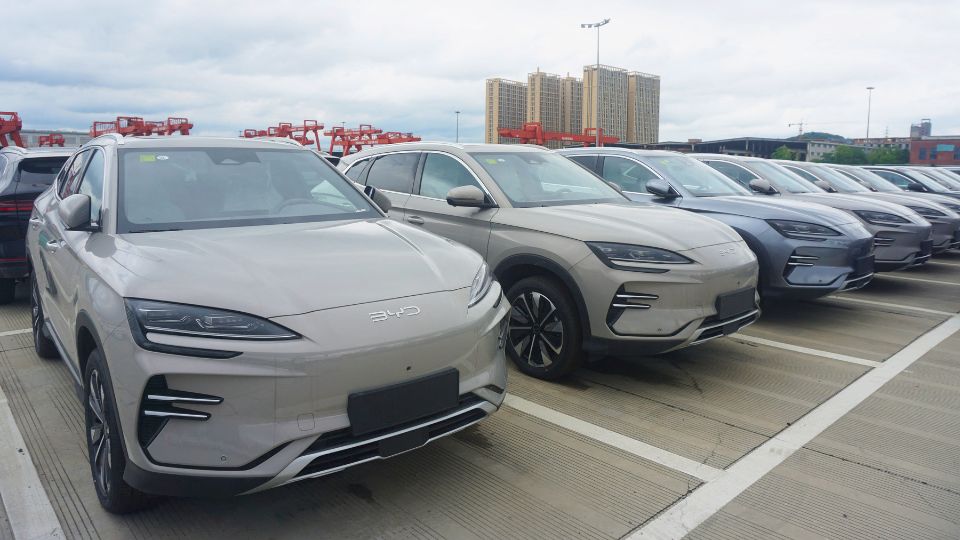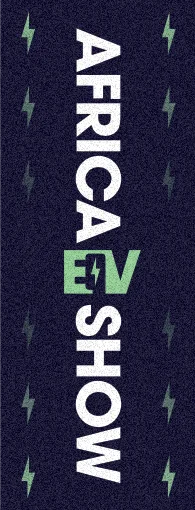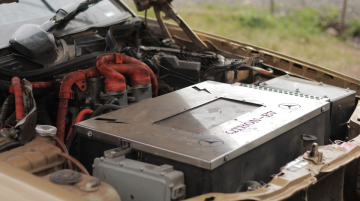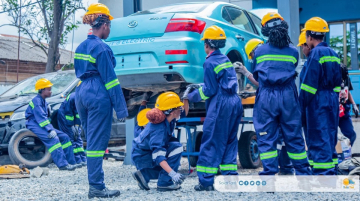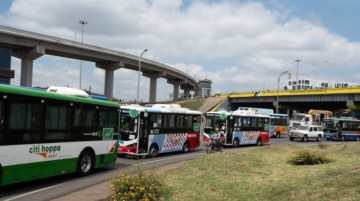Nigeria’s electric vehicle (EV) sector is gradually shifting from skepticism to adoption, driven by growing awareness and cost-saving incentives. Corporate fleets, tech-savvy youth, and middle-to-high-income earners are leading the charge, attracted by Chinese brands like BYD and Neta and American brands like Tesla. However, affordability remains a hurdle, with even some pre-owned EVs starting at $25,000. To spur the adoption of electric vehicles in Nigeria, EV World Africa and its sister company, Electric Mobility Center, offer subsidies, free charging stations, and financing solutions—though convincing Nigerians to embrace loans is an ongoing challenge.
Infrastructure and policy gaps persist and while Nigeria boasts over 5,000 EVs (including two- and three-wheelers), charging networks are sparse, and unclear customs waivers for EVs create bottlenecks.
To accelerate adoption, there is need for streamlined policies, local talent development, and collaboration among stakeholders through bodies like the Electric Mobility Promoters Association of Nigeria. Despite these hurdles, startups are pushing forward: EV World Africa plans to launch a training center and expand free charging stations nationwide, while local assembly—though not yet manufacturing—remains a long-term goal.
Nigeria’s EV journey is a marathon, not a sprint—one that could set the tone for Africa’s electric mobility future. For now, the focus is on laying the groundwork through education, infrastructure, and partnerships. This week, EV World Nigeria’s General Manager, Michael Agbor, joins us to give us a clearer picture of the EV market in Nigeria.
Show Notes:
- The Sustainability Grid Podcast: The Reality of Driving an Electric Vehicle in Nigeria: Prices, Batteries, chargers
- TechPoint.Africa: NEV Electric hits $14 Million Revenue as Nigeria’s EV Market Gains Momentum by Bolu Abiodun
- Bloomberg: Chinese EVs Make Inroads in Nigeria as Gasoline Prices Rise by Anthony Osae-Brown and Emele Onu
About Michael Agbor:

Michael Agbor is a Nigerian energy and mobility expert who transitioned from oil engineering and banking to lead EV adoption in Africa. As General Manager of EV World Africa, he drives sustainable transport solutions, charging infrastructure, and policy advocacy, bridging fossil fuels and green mobility. His background in oil/gas and finance informs his pragmatic approach to Nigeria’s energy transition. At EV World Africa, Agbor collaborates with government, automakers, and financiers to promote EVs through training, charging networks, and affordable financing. He partners with Electric Mobility Center to subsidize EVs and expand access while advocating for local capacity building to support the sector’s growth.
Transcript:
Njenga Hakeenah: This week, we head to West Africa to speak to a gentleman who transitioned from banking and oil engineering to sustainable mobility and electric vehicles. Hello and welcome to the Africa EV show. I am Njenga Hakeenah in Nairobi.
E-mobility is changing Nigeria in ways and on a scale that only a Nigerian fully understands. In June 2021, Stallion Motors unveiled the first made-in-Nigeria EV, the Hyundai Kona. Two weeks prior, the National Automotive Design and Development Company inaugurated Nigeria’s first EV charging station in Sokoto State at the Usmanu Danfodio University in Northwest State.
Currently, Nigeria has at least 10 electric vehicle dealerships selling EVs, most of which are Chinese brands. Across two, three and four-wheelers, Nigeria has an estimated 5,000 EVs on the road in total. Despite the seeming growth, Nigeria is still handicapped by an erratic power supply, but to give us a better perspective on what is happening in the Nigerian EV space, we are joined by Michael Agbor, the General Manager of EV World Africa.
Agbor is an oil engineer and banker turned electric car dealer, and EV World Africa also works with Electric Mobility Center, which is the first all-electric car dealership in Nigeria. Hello, Agbor, and welcome to the Africa EV show. It is great to have you.
Michael Agbor: Hi, Njenga.
Njenga: Good to see you, man. So we start off by looking at Nigeria’s EV sector from a bird’s eye view.
What is the trend you have noticed over the past, you know, like five, six years regarding EVs adoption in Africa’s most populous country?
Agbor: The EV adoption in Nigeria has transitioned from skepticism to growing interest and gradual adoption. So at first, you know, it has always been the case where people have always been in disbelief of electric vehicles. And then as awareness builds up and then people start getting interested in it, people are doing research, and then now you have a lot of people accepting electric vehicles in Nigeria.
Njenga: And I want to just get on to what your sister company, Electric Mobility Center, is offering an EV subsidy to unlock affordable electric mobility in Nigeria. How does this work? And was it advised by the trends you just described?
Agbor: Yes. So you know how you need to make it very good for people to want to adopt something new.
So that was what we just looked at, you know, in collaboration with the guys at Electric Mobility Center, we looked at it and we’re like, we need to make it very good for people to want to adopt electric vehicles. So at EV World Africa, what we do also is to provide free charging infrastructure for organizations, you know, so because one of the things a lot of people ask is, where will I charge my vehicle? So now I tell you, oh, don’t worry about that. I will provide free charging infrastructure for you because a lot of organizations have excess power supply.
So we at EV World Africa, what we do is to provide free charging infrastructure, and then the guys at Electric Mobility Center always make sure that the pricing for the EVs, you know, they are close to the prices for the ICE vehicles. So that way you’re able to tell people that instead of you getting an ICE vehicle, why not go for, you know, a relative model in an EV.
Njenga: And when you talk of the EV charging infrastructure, is it, you know, like the chargers that you install, or is it the whole value chain? Like, I will be charging for free forever.
Agbor: So of course, nobody can charge for free forever. It’s not sustainable. But in these first years, you know, trying to build the adoption, you know, it’s just our own way of contributing to the growth of the ecosystem in Nigeria.
So for example, people that purchase their vehicles from Electric Mobility Center can always drive into any of the EV World Africa charging stations, you know, and then you get to charge for free.
Njenga: Electric Mobility Center also offers EV financing solutions, which is to enable as many Nigerians as possible to own an electric vehicle. How does this work? And who are your partners?
Agbor: So for now, we also partner with like a couple of traditional car dealers. We, they already have some form of car financing structure. So we just latch on onto their own structure to provide financing for people that want to get electric vehicles. But at the moment, we’re also looking at partnering with some banks, you know, to make sure that, you know, it’s a direct thing where our customers can just walk in directly to the Electric Mobility Center.
And, you know, just get car financing easy instead of having to go through a third party.
Njenga: So you’ve got out the middlemen, so to speak, and deal directly with the financing institutions to enable your customers buy these vehicles across many African countries, including Kenya, where I come from. It is very difficult to get financing for a vehicle for most of the population.
How is it in Nigeria?
Agbor: The same thing, actually very difficult. First of all, you even have to convince people to get financing. It’s a very tough tax because Nigerians don’t really function well with loans at all.
So Nigerians would prefer to, you know, save up cash and then buy these vehicles outrightly. So it’s still another process entirely trying to convince Nigerians to, you know, actually buy these vehicles through financing.
Njenga: It is interesting when you talk about Nigerians not being good with loans.
I don’t think any of us is good with money, especially when it has been spent. You have spent the money, so really, why am I paying it? And how popular is this product, if I may call it that, with your customers? Are people coming in and saying, because we are hearing you’re offering financing solutions, then I am interested?
Agbor: You know, the outright cost of purchase for an EV is quite high. And, you know, so some people walking to say, oh, they’re interested in getting an EV, you know, even down to corporate fleets that are saying that they want to switch their entire fleet from ICE vehicles.
It actually makes people more interested in, you know, trying to get these vehicles. But the main thing is still convincing Nigerians about car financing. That’s the thing.
So the major focus is still trying to get people to actually say, oh, ok, I am going to get this vehicle and then spread the payment across months or, you know, years. Like that. So we still have a very long way to go.
But I believe that in the next one to two years, the number of people that will be using EV financing would increase.
Njenga: How is the Nigerian EV infrastructure like? And would this be one of the issues holding buyers back?
Agbor: So when you say infrastructure, do you mean the charging infrastructure?
Njenga: Charging infrastructure, the roads. Because in Kenya, we know there are some places where if you drove your EV, most likely you will not come out of that place with your EV alive, because maybe flooding and issues like that.
Agbor: Well, so flooding is not an issue for an EV. You know, in fact, EVs would handle flood better than an ICE vehicle. Yeah.
And, you know, I get to hear this a lot from people. You know, they say you hear very funny things from people where they say, oh, can you enter this vehicle when it’s raining? Can you drive while it’s raining? If it’s flooded, if the road is flooded, can you drive your EV there? And trust me, like, I really like questions like that, because I have a lot of videos where, you know, I’m driving an EV through water, you know, like one meter high water and then like driving it. And I do this just because, you know, I get to hear a lot of these questions.
And for the road conditions, I think that the best approach is actually getting EVs that have very good ground clearance. If you have an EV that, you know, the ground clearance is quite good, why not? You can drive your EV anyway. If you check EV World Africa’s YouTube, we have several videos of us taking our EVs interstate, you know, four hour journeys, five hour journeys, you know, three hour journeys.
We’ve done that just to prove that, you know, these EVs, you can drive them anyway.
Njenga: Makes a lot of sense because, again, you know that our roads across many African countries are interesting. Not as bad in some places, but in some places unusable, almost.
We can shift. And which demographic is most interested in purchasing EVs in Nigeria? And why do you think this is the reason? And which are the most popular brands that you sell? OK, so for now, you have the corporate organizations.
Agbor: Currently the strongest demand for EVs are from the corporate organizations because, you know, they are thinking from two sides, cost saving and also the sustainability angle.
So, yes, you have the corporate organizations, you have the fleet operators, then you have the middle to high income earners, you know. Well, they are all looking at cost saving, basically. And then you now move into the younger tech savvy Nigerians that have watched YouTube videos, they’ve watched Instagram and all of that, you know, and then they see these things and then they are interested because the Chinese, for example, are making very, very, very good EVs at the moment.
And it is very attractive for young Nigerians. So, yes, we have interests from across, you know, different spectrums of Nigerians. For the models at the moment, you have the really, really luxurious EVs.
That’s what Nigerians are buying because between December last year, 2024 to date, I’ve seen about four to five Rolls Royce Spectre in Nigeria. And then you have a lot of Cybertrucks in Lagos.
Njenga: You drive a Cybertruck?
Agbor: Oh, no, I don’t drive a Cybertruck, but I know people that own Cybertrucks.
So, yes, I get to drive their Cybertruck.
Njenga: And then when we talk about demographics also, they have their preferences. You have mentioned the Rolls Royce, but for the regular, ordinary Nigerian car buyer, which are the most popular brands?
Agbor: I’ve seen some people buy the Tesla model Y but not the 2024 or 2025 model, you know. So a lot of people go down to like the 2021 model, which is like pre-owned vehicles. So they buy these pre-owned vehicles from America or from China and then bring them down to Nigeria for use.
So, yes, you have the Tesla Model Y, Tesla Model X. You have the BYD. The BYD is also quite common in Lagos. You just have people just driving their BYDs like regular people and not even making noise about driving an EV.
You have a couple of Neta Ayas in Lagos. Yes, you have some Leap models. It’s basically a variation of a couple of different brands.
But for the popular brands, I would say the Tesla, the BYD, the Neta, the X-Peng. You have quite a number of that in Lagos.
Njenga: Having seen and heard what you’ve shared regarding people buying even pre-owned EVs, what would you say is the price range for most basic EVs in Nigeria?
Agbor: At the moment, the cheapest EV you would get in Nigeria is around $25,000.
Njenga: Even pre-owned?
Agbor: Yes, even for pre-owned, yes. The cheapest you would get in Nigeria is $25,000. And the brands? You cannot get a Tesla for $25,000, even a pre-owned Tesla.
You need to start looking at around $35,000 and then you need to go around the 2018, 2019 Teslas for you to get a Tesla around that price range. So you have some very small BYD, like the BYD Yuan. So you can get a 2020 BYD Yuan around that price range.
Njenga: Pre-owned?
Njenga: Yes, pre-owned, not a new one.
Njenga: Do these pre-owned vehicles come with issues, if I may ask that? For the guys at Electric Mobility Center, what the guys at EMC do is that they actually carry out proper inspection on these vehicles before they are purchased and then imported into the country. There’s a battery health check, they do all-round checks around the vehicle to make sure that these vehicles are in pristine conditions before bringing them in.
Njenga: We can shift and look at Nigeria’s public transport system and the adoption of e-buses, e-bikes and three-wheelers. Is this happening in Nigeria? Yes, slowly happening. I think sometime last month, we had a company launch their EV buses in Nigeria.
I think that was in Abuja. And for the e-bikes in Lagos, you already have a very good number of e-bikes already, especially for last-mile delivery. Yes, so you have the adoption of e-bikes.
I think it’s going on very good. There’s still a lot of work to be done. For the three-wheelers also, I know in Kano state, there’s a program around the adoption of the three-wheelers.
So yes, there’s still a whole lot of work to be done. For the e-buses also, in Lagos, you have a pilot phase for two e-buses currently going on.
Njenga: Do you have a number, because we have the general data, and of course, finding accurate data in African countries is very tricky. So the data we have is about 5,000 EVs across two-wheelers, three-wheelers and four-wheelers in Nigeria. Is that correct?
Agbor: I cannot accurately say if that’s correct or not, to be honest. I really cannot say if that’s correct or not, because we don’t have data collection for these things in Nigeria for now.
So maybe some of these organizations are bringing EVs, other companies, other e-mobility companies are bringing EVs, and then they probably have a number in their database that they’ve sold and all of that. But if you try to put a number to it, I cannot say if it’s correct or not.
Njenga: 2021 is when you guys did the first locally assembled EV, which was Hyundai Kona. Has this local aspect of manufacturing changed in Nigeria? Are there any companies that are doing full manufacturing, or is it just assembling?
Agbor: I don’t think anyone can even do EV manufacturing in Nigeria for now. The reason being? Policies and then even the supply chain, especially the supply chain, because where do you start from? Talking about battery assembly, battery manufacturing, even the parts also, it’s still very much far from there. We’ve not even started manufacturing ICE vehicles.
For us to now move into manufacturing EVs, that’s another conversation entirely. So I think that the approach that we need to have in Nigeria is to, first of all, start with importation, which will build the adoption and then slowly we move into assembly and then into manufacturing. I think we can continue that because of the role of the Nigerian government in accelerating EV adoption.
Njenga: So what kind of policies do you think would work to increase EV adoption, local manufacturing incorporated?
Agbor: For incentives, already in Nigeria, it is claimed, let me put it this way, it is claimed that there is a zero customs duty on EV vehicles. It is there, but you know, it’s a very, very cumbersome process trying to get this incentive, you know. You cannot just bring in your vehicle and then you just try to clear it and just declare to customs that this is an electric vehicle and then they just let you pass, no.
The process of trying to get the waiver, it’s a whole lot for people. And then so some people make the mistake of, you know, they saw it on social media or in the news that EVs are customs duty free and then they end up going to purchase these EVs and then when they bring these vehicles to Nigeria and then they meet a bottleneck of trying to, you know, get the waiver for these vehicles. So yes, there’s a customs duty waiver, but getting it is very tough.
You also have the VAT exemption for EVs. But, you know, I can’t really say that these things are being implemented fully in the country yet, for now. So I feel like what the government needs to do is actually make this process very easy, where, you know, within a day or two you’re applying for a waiver and then you can get it.
Njenga: Because government policy is shaped by stakeholders. How vibrant is the EV community in Nigeria? This includes dealers, importers and everyone that is in the EV value chain because they are the ones to inform policy.
Agbor: Amongst the stakeholders, you know, whenever you meet someone else in the e-mobility sector, you know, everybody all talks about collaboration over competition.
So, but yes, you know, it’s very easy for us to all gather ourselves one place and then say, oh, collaboration over competition. In the real sense of it, nobody’s collaborating because, you know, everybody’s primary focus is still on their own organization. You know, trying to place the organization, you know, tops.
You know, you want to be the most recognized EV brand in the country. So, of course, yes, we would preach collaboration, but we all know that we are still competing amongst ourselves. But I think there’s still one common body that still brings us all together.
There’s the Electric Mobility Promoters Association of Nigeria, which was really recently formed. It’s still a body that, you know, is trying to come together and then bring all the players in the EV space, from the two wheelers, the three wheelers, the four wheelers, the e-buses, even down to guys that provide charging infrastructure and all of that. So, yes, the association is still, for now, the common body that’s still trying to bring in everybody to see how we can work towards a common goal.
Njenga: Having explained and experienced these challenges, where do you see EV World in the next five years? And in terms of expansion, what are your projections that you can share with us?
Agbor: For now, first on our agenda is actually developing local talent, because it’s one of the blockers to the EV adoption in Nigeria. So, even if you manage to convince someone to say, you can buy an EV or buy an EV, it’s very good for you to use, you know, saves costs. You’re also saving the planet, you know, you come from a different perspective.
But sometimes people are concerned and then they say, who will fix this vehicle for me? It’s a common thing amongst Nigerians, because like, you know, people are very scared. You know, you end up buying a vehicle where you have an issue and then there’s no one to fix it. So, top on our list is actually developing local talents.
And the next two to three months from now, we will be officially launching our electric vehicle learning center in Lagos, which would, you know, be a very good one to develop local talents across the country.
And then after that, you know, we’re also trying to look at driving policy advocacy in the country, you know, to see how, you know, we can push for tax incentives, you know, free registration of EVs, you know, just different ways to really boost the adoption. You know, another thing is also to see how we can expand our free charging station.
So, at the moment, you know, we’re trying to look at how we can have probably about six charging stations across the different geopolitical zones in the country. And then, you know, there are going to be free charging stations that people can just drive their vehicles there and then charge for free. And then, you know, also to accelerate fleet electrification, you know, while working on different models to see how we can encourage organizations, you know, to adopt EVs as part of their fleets.
So, yes, I think that over the next five years, that’s what we aim to achieve.
Njenga: Now that you have mentioned chargers, how many do you have currently?
Agbor: So, at the moment, we have about four charging stations in Lagos. So, they’re a combination of both, you know, level two and level three chargers.
At the moment, we have one charging station with 60 kilowatts, with a 60-kilowatt charger. We have another charging station with a 20 kilowatt DC fast charger. Yes, and then at different places, we have seven-kilowatt AC chargers.
Njenga: How many vehicles have you sold so far? How many EVs have you sold in Nigeria across all the brands?
Agbor: We’ve done over 30. The thing is that the market is still growing. It’s one step at a time, but most times what we also do is to provide support for other players also in the e-mobility space.
So, you know, even down to the charger installation. So, we provide support also on that for other players in the e-mobility space because, you know, it’s one thing for you to be able to sell a vehicle. It’s another thing for you to know the right charger to recommend to a customer.
Yes, so what we do also is just to provide support across the entire ecosystem.
Njenga: Michael Agbor is the general manager of EVworld. Africa in Nigeria and has been an enlightening conversation and looking at the future with Nigeria being the most populous nation in Africa.
Outro: Any EV maker looking to grow their business had better look into Nigeria, not to miss out on the opportunity. EV World Africa is definitely a company to watch due to its ambition to expand its e-mobility offerings across the continent. And with many Chinese EV companies looking to expand beyond China, Nigeria could be a good measure of what the EV future could be like.
For now, we leave it there. But before we go, just a reminder that I would be happy to discuss the EV innovations happening in your country. If there are some EV ideas, tech or businesses making great things happen, leave me a note at njenga at chinaglobalsouth.com and also don’t forget to check out everything that we are doing at the China Global South project by going to our website www.chinaglobalsouth.com and our YouTube channel.
I’ll see you again next week with another edition of the Africa EV Show. But until then, enjoy the rest of our programs on YouTube and on our website www.chinaglobalsouth.com.
And I look forward to seeing you again soon.

